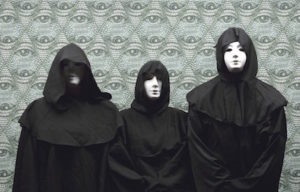Wine and the Evil Cabal of Patriarchs
 Let me start by inviting anyone to try to paint me as a misogynist; to make the case that I’ve worked to protect the “patriarchy”; to argue that my perspective and my work and my writings have diminished the role of women in the wine industry.
Let me start by inviting anyone to try to paint me as a misogynist; to make the case that I’ve worked to protect the “patriarchy”; to argue that my perspective and my work and my writings have diminished the role of women in the wine industry.
With that invitation issued, please someone tell me why I’m wrong to read the following and think to myself, what a bunch of crap:
“What is the impact of mostly white men occupying these influential roles?
“It means that wine programs can start to look the same. Groups of male wine buyers get together and worship specific producers (usually also men), creating cult followings around particular brands. They relish their joys on Instagram and feature them in their beverage programs as trophy bottles. These producers are then everywhere on wine lists throughout New York. As a result, demand goes up — as do the prices of these wines — and the financial reward tends to go toward a similarly homogenized group.”
My position on the kind of group identity ideology evidenced in the Eater New York article from which this quote is taken has always been the following: unless you are willing to apply the same rigorous demands for fairness to all groups and identities that you apply to the group or identity you are working to lift up, then I have no good reason to take you seriously.
“Groups of male wine buyers get together and worship specific producers (usually also men)”?
We aren’t reading some sort of implication here. What we are reading is a conclusion that male wine buyers are colluding to lift up male-made wines, then they are falling on their knees in some sort of group ritual to worship these male-made wines, in pursuit, in part, of excluding female-made wines from a place on their wine lists.
The fact that this isn’t true isn’t the startling thing. It’s the fact that someone felt comfortable making the claim, and doing so publicly no less.
The Eater New York article by Victoria James, partner and beverage director at New York’s Cote Korean Steakhouse, is a call for more diversity (particularly gender diversity) within the world of wine buyers, particularly in the wine mecca of New York City. It’s not a hard goal to get behind.
But what’s so striking about the case Ms. James makes is that she does so by working overtime to imply that men (white men, in particular) reside just south of the latitude of evil. In the past, I’ve criticized the way “natural wine” champions have used “denigration marketing” in order to lift up the profile of the wines they love. Ms. James’ effort to uplift women wine buyers appears to be no different.
It’s also fair to point out that when you look at the wine list of Cote, where Ms. James directs the wine program, you’ll find the very same wines that she claims are being worshiped by men for the purpose of lifting up men:
Latour, d’Yquem, Krug, Moet, Ruinart, Tempier, Joly, Trimbach, Niellon, Coch-Dury, Leflaive, Dr. Loosen, Dujac, Ponsot, Grivot, Chevillon, Chave, Rayas, Cos D’Estournel, Mouton, Gruaud-Larose, Leoville Barton, Margaux, Palmer, Haut-Brion, L’Evangile, Petrus, Cheval Blanc, Marcassin, Littorai, Williams Selyem, Dalla Valle, Quintessa, Mayacamas, Futo, Vineyard 29, Caymus, etc.
In addition to these apparently white male wines, Cote also features a variety of outstanding wines from across the globe. It’s a great list. But it’s a little eye-opening that the same wines Ms. James claims are being lifted up by a cabal of white men also show up on her wine list.
There are a number of groups and organizations throughout the wine industry (Women for Wine Sense, Women of the Vine & Spirits, Women in Wine Leadership Symposium, Battonage, Wine Women and others) that are not denigrating other groups in their work to lift up and support the careers of women in the wine. Ms. James, and the organization she has helped to create—Wine Empowered—could also be such a group. But without providing a dollop of fairness to other groups while in the process of working to lift up women, it’s hard to take her effort seriously.

Oh, my goodness! Really rather absurd. Can’t go with the uplifting any producer apart from an excellent one. Who cares who, where, what, when, how OR even why if a great wine is produced? Ah, suppose forgot the final of the 7 requirements: how much?
Rather silly, like the current movement in ‘orange wines’, many of which belong as water for the vineyards. Why? If they taste great, fine; if not, no.
“what a bunch of crap” Yes, and it starts with the fact that it’s wrong. Women-made wines are very prevalent, although one often doesn’t know the sex of the winemaker unless you visit. I’ve visited many wineries in France where the winemaker is a woman, often having learned from her father.
And Helene, as to your comment: “If they taste great, fine; if not, no.” That’s my position, but I was recently criticized for it by a natural wine proponent. I mentioned 2 wines I had by a producer who is famous in the natural wine field, and they were both horrible. I was told that my taste was clearly trained on conventional wines, so I couldn’t appreciate those [dreadful] wine.
Your article gave me a lot of inspiration, I hope you can explain your point of view in more detail, because I have some doubts, thank you.